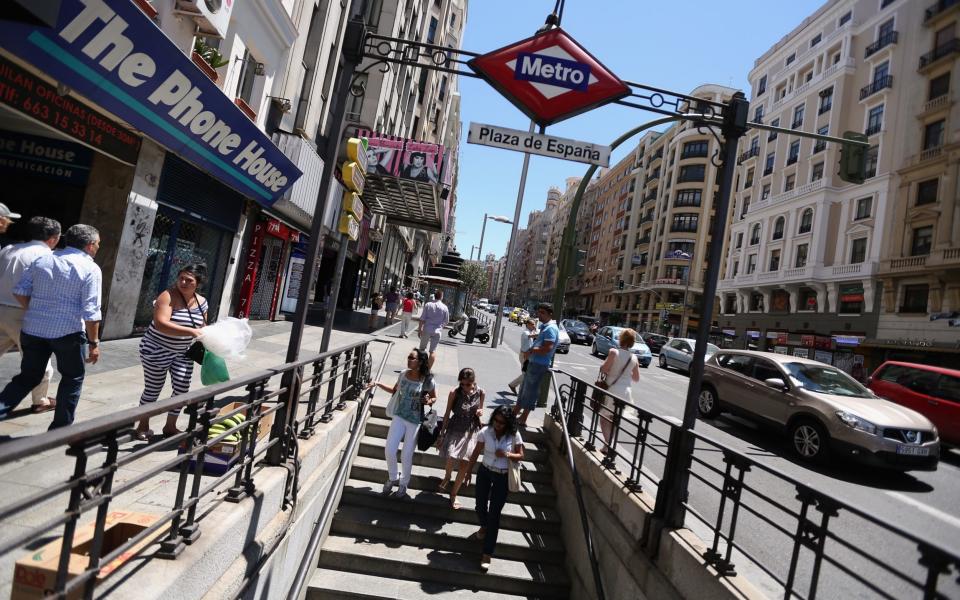Spain's ailing economy could become another headache for the eurozone

Is Spain at risk of becoming the eurozone’s next crisis in the making? Angela Merkel’s government fears it could be.
Berlin is said to be growing increasingly concerned that Spain rather than Italy or Greece is now the region’s potential tinderbox.
German officials are worried the economic damage and the political turmoil caused by the country’s Covid setbacks could ripple beyond its borders, according to Bloomberg.
Its virus response has been beset by bitter political infighting, unemployment is rising fast and business surveys suggest the recovery is now back in reverse gear. The capital, Madrid, is facing new restrictions this week that will bring in hospitality curfews and limit gatherings, erupting old faultlines between central and regional governments.
Already the region's worst performer during the first half of 2020, Spain is at risk of a miserable second half as well, forecasters warn.

Paul Smith, economist at IHS Markit, says the risk of a double dip downturn is “mounting” as job losses pile up and rising cases threaten to bring back damaging restrictions.
“The recovery is unlikely to be sustained at anywhere near strong enough rates to help close the considerable output gap that opened up in the first half of the year,” he says.
IHS Markit’s purchasing managers’ index indicated this morning that the private sector contracted for a second straight month in September as officials struggle to contain the second wave.
“These numbers aren’t pretty, effectively confirming that the Spanish economy is now being hit hard by the return of the virus and the associated restrictions imposed to contain it,” warns Claus Vistesen, eurozone economist at Pantheon Macro.
A perfect storm of factors makes Spain’s economy highly vulnerable to the pandemic. Its economy contracted by 23pc in the first half of the year, the largest plunge in GDP of any European country and only matched in size by the UK.
Spain was hurt by an ultra-stringent lockdown, the economy’s reliance on social consumption – face-to-face services spanning tapas bars to hairdressers – and tourism suffering a lost summer.
Britain and other countries were quick to reimpose travel restrictions on Spain that effectively ended the summer season with tourism facing the brunt of job losses. Prior to the pandemic, tourism, the third-biggest industry in Spain after financial services and manufacturing, accounted for 12pc of GDP and 13pc of employment.
Away from its manufacturing and financial hubs, the blow from a soggy summer was even greater. On the Canary and Balearic islands, tourism makes up around a third of output.
Rabobank economist Maartje Wijffelaars warns it will take years for Spain's GDP to recover to pre-virus levels.
“Job losses and weakened private and public balance sheets will put a lid on growth in demand, while losses in some hard-hit sectors take time to recover,” he explains. “Tourists will not catch-up for all lost holidays, for example.”
The pandemic has also exposed old economic vulnerabilities and deepseated political tensions.
Covid-19 is putting pressure on already stretched public finances and has delivered a big blow to a dysfunctional jobs market.
The overreliance of temporary contracts in Spain means the government’s furlough scheme was unable to protect many jobs. Unemployment was already high at 13.8pc prior to Covid-19 but has risen sharply in recent months to 15.3pc with more redundancies expected to come. Rabobank forecasts unemployment to hit 20pc next year.
“The Spanish labour market really did suffer very badly,” explains Jessica Hinds, Europe economist at Capital Economics.
“Spain relies a lot more than other eurozone countries on temporary employment… Under temporary contracts it’s very easy to get rid of people if you are facing a complete collapse in your revenue.
“It’s not surprising household spending also slumped because there isn’t that visibility of employment like you might have had in Germany, for example.”
Prime minister Pedro Sanchez has also had to face down political tensions on several fronts. While volatile Italian politics grabs international attention, Spain has also struggled for stability in recent years with two elections fought in 2019.
Wijffelaars says the pandemic turmoil “illustrates Spain’s governance crisis, significant political polarisation and the current government’s limited mandate”.
Not only did Sanchez have to fight for fiscal help from other European countries but his PSOE is in a fragile coalition with the far-left Podemos and the PM has faced fierce opposition from powerful regional governments.

One poll over the weekend found that 85pc of Spaniards believed political spats had undermined attempts to control the virus.
The most recent flashpoint has pitted the centre-left Sanchez against the capital’s right-wing administration, which resisted new economically-crippling measures despite the surge in cases in Madrid. The capital’s leaders said they would obey Sanchez’s new measures but plan to challenge them in the courts.
Hinds warns that turbulent Spanish politics is “definitely a key risk factor for the economy at the moment and the recovery”.
Plateauing infection rates have offered a glimmer of hope for Sanchez in recent days. But even the passing of the second wave’s peak will do little to solve the myriad of problems facing Spain's post-pandemic economy.

 Yahoo Finance
Yahoo Finance 